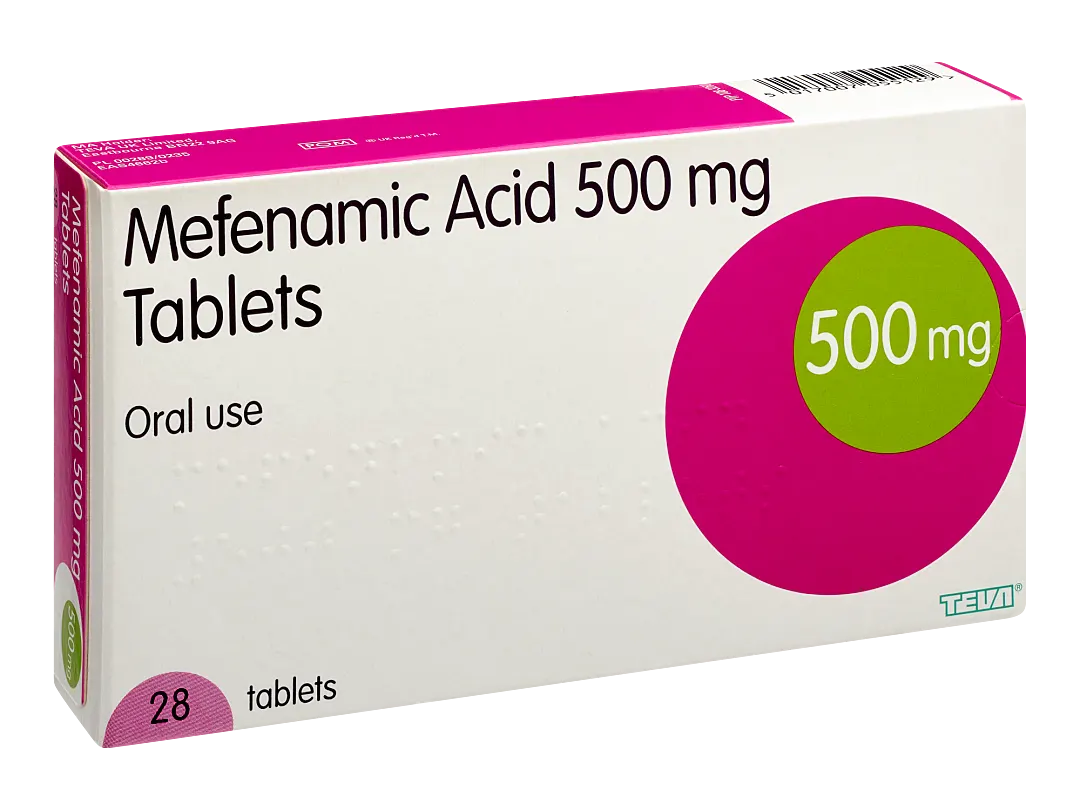
£24.99
Variety of delivery options including next day & free delivery.
Pharmacy, clinic and prescribers based in Greater Manchester.
Start your treatment with a quick and free online consultation.
 This is a prescription product.
This is a prescription product.You need to complete a consultation form and allow our pharmacists to access your NHS records for review before we can issue this treatment.
Variety of delivery options including next day & free delivery.
Pharmacy, clinic and prescribers based in Greater Manchester.
Start your treatment with a quick and free online consultation.
Fill in a quick online consultation for our licensed pharmacists to review.
Our pharmacists will review your treatment to ensure it’s suitable.
Your treatment will be delivered to your door quickly & discreetly.
| Medication Name | Mefenamic Acid Tablets |
| Active Ingredient | Mefenamic Acid |
| Type and Form of Medicine | Film-coated NSAID Tablet |
| Used to Treat | Heavy periods, period pain, inflammation, arthritis pain |
| Available Dosage | 500mg |
| Common Side Effects | Stomach upset, nausea, dizziness |
| Prescription Required | Yes |
| How to Take | 3 times daily with food |
| Patient Information Leaflet | Mefenamic Acid Patient Information Leaflet |
Mefenamic acid is a prescription-only medicine that belongs to a group of medications called nonsteroidal anti-inflammatory drugs (NSAIDs). It’s specifically designed to reduce inflammation, pain, and discomfort.
Mefenamic acid is the same active ingredient found in the brand-name medication Ponstan, and it’s been used safely for decades to help women manage problematic periods.
Mefenamic acid is prescribed to treat mild to moderate pain and inflammatory conditions.
The medication is commonly used to treat:
For period problems specifically, mefenamic acid is often prescribed when regular painkillers aren’t strong enough, or when heavy bleeding is significantly impacting your quality of life.
Mefenamic acid works by blocking enzymes in your body called cyclooxygenases (COX enzymes). These enzymes produce chemicals called prostaglandins, which are responsible for causing pain and fever.
For heavy periods specifically, mefenamic acid helps in several ways:
The medication is most effective when taken at the first sign of your period starting, rather than waiting until symptoms become severe.
Mefenamic acid is suitable for adults and children over 12 who need help managing heavy or painful periods or other types of pain and inflammation.
For period-related issues, your healthcare provider will typically recommend mefenamic acid if over-the-counter painkillers like paracetamol or ibuprofen haven’t provided enough relief, or if your periods are particularly heavy.
The medication can be used on its own or alongside other treatments for managing heavy periods, depending on what your doctor or pharmacist thinks will work best for your situation.
Mefenamic acid isn’t suitable for everyone, and you shouldn’t take it if you have certain medical conditions or are taking specific medications.
You cannot take Mefenamic acid if you:
Tell your doctor before taking mefenamic acid if you:
Your doctor will review your medical history and current medications to make sure mefenamic acid is safe and appropriate for you.
Active Ingredient: Mefenamic acid (500mg per tablet)
Inactive Ingredients: Lactose monohydrate, pregelatinised starch, croscarmellose sodium, povidone, microcrystalline cellulose, colloidal silicone dioxide, magnesium stearate, Opadry II Yellow (hypromellose, lactose monohydrate, titanium dioxide, macrogol, iron oxide yellow, talc, iron oxide red)
Mefenamic acid tablets come in one standard strength: 500mg film-coated tablets.
The usual dose is one 500mg tablet taken three times daily with food. This provides a total daily dose of 1,500mg, which is the recommended amount for most conditions, including heavy periods.
Start taking mefenamic acid at the first sign of your period beginning, rather than waiting for symptoms to become severe. Continue taking it regularly throughout your period as directed by your doctor or pharmacist.
Important dosage notes:
Like all medications, mefenamic acid can cause side effects, although not everyone experiences them.
NSAIDs like mefenamic acid may be associated with a small increased risk of heart attack or stroke, particularly with long-term use.
If you experience any side effects not listed here or are concerned about any symptoms, you can report side effects directly through the Yellow Card Scheme and speak to your prescriber.
EXCELLENT
Mefenamic acid and ibuprofen are both NSAIDs, but they work slightly differently. For heavy periods, mefenamic acid is often more effective at reducing bleeding than ibuprofen. However, “stronger” depends on the individual and the condition being treated. Your doctor will recommend the most suitable option for your symptoms.
Mefenamic acid should always be taken with or immediately after food. Taking it on an empty stomach can cause stomach irritation, nausea, and increase the risk of stomach ulcers.
Mefenamic acid is a non-steroidal anti-inflammatory drug (NSAID), so it reduces inflammation, pain, and fever by blocking certain chemicals in your body that cause these symptoms.
No, they are completely different medications. Mefenamic acid is an NSAID that reduces pain, inflammation, and bleeding. Tranexamic acid targets heavy bleeding by helping blood clot more effectively, but it doesn’t relieve pain.
Drowsiness and dizziness are possible side effects of mefenamic acid, though not everyone experiences them. If you feel sleepy after taking it, avoid driving or operating machinery until you know how it affects you.
Mefenamic acid and naproxen are both effective NSAIDs, but they work differently. Mefenamic acid is particularly effective for heavy periods because it specifically targets the prostaglandins that cause heavy menstrual bleeding. Naproxen is better for general pain and inflammation, but may not be as effective at reducing heavy bleeding. For menstruation-related problems, Mefenamic acid is often the preferred choice.
Mefenamic acid is a prescription-only medicine in the UK. You’ll need to see a doctor or complete an online consultation to get it prescribed.
If you’re trying to become pregnant, you should avoid Mefenamic acid as NSAIDs can make conception more difficult. Speak to your prescriber if you’re trying to get pregnant or having fertility problems.
You should avoid alcohol while taking Mefenamic acid. Alcohol increases the risk of stomach bleeding and can worsen side effects like nausea and stomach irritation.
Period pain can be hard to manage, but Mefenamic Acid is one option that works well for many. It’s part of a group of medicines called NSAIDs, which help reduce the inflammation that causes cramping.
I often see patients feel a lot more in control when they take it at the first sign of pain. In most cases, they only need it for a day or two before the worst has passed. Taken as needed, it helps you carry on with your routine without being slowed down by period pain.

Dr Hussain Ahmad
Page content authored by Amjad Khan, last reviewed by Mr Mohammed on 24th June 2025.







